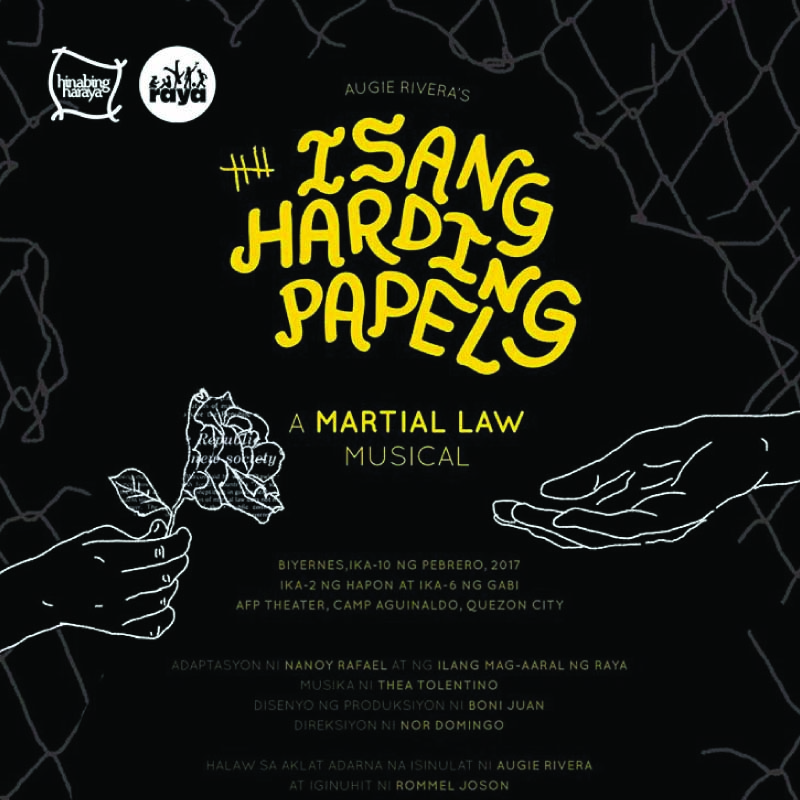
The Raya School successfully restaged last Feb. 10 “Isang Harding Papel: a martial law musical” to two sold-out audiences at the AFP Theater in Quezon City. Since the school opened in 2005, it has been staging a school play every year under the banner, Hinabing Haraya. To celebrate the 30th anniversary of EDSA People Power, The Raya School chose to stage last Oct. 29 “Isang Harding Papel,” based on Augie Rivera’s children’s book of the same title.
Nanoy Rafael, a teacher at Raya School, and several students adapted the book for the stage. Another teacher, Thea Tolentino, did the musical arrangement. A parent of a Raya alumna, stage actor and director Nor Domingo, directed the musical.
“Isang Harding Papel” is based on a true story of a young child who grew up with her mother in prison as a political detainee. As young as she was, Jenny had to face the realities of the political situation in the country. The play also focused on the effects of martial law on families. Inspired by her mother to look at the positive side and hope for the best, she grows up and as a teen witnesses the results of the work of a generation who fought the dictatorship.
This play would never have been possible if the school itself has not been molding our children to be aware of the things around them and the things that happened in the past. Every week before Feb. 25, the school holds its own martial law. For preschoolers and early grades, the rules are simple, sometimes even silly, like no whispering or hopping on one foot to go to the toilet. Higher grades experience a deprivation of rights like a 15- or 20-minute lunch period only, no playing during recess, no sharing of toys.
The high school students act as the Metrocom and police the classrooms throughout the week. The children really get “injailed,” as my then 4-year-old put it when they break the rules. The entire point of the exercise is to show children that there really is injustice in the world and we fight against that injustice with every core of our being. If the children learned about martial law, then yes, the older children also learn about the extrajudicial killings (EJKs) currently happening. They are young, but they are never coddled. They are taught the value of life – any life. They are taught the truth and that truth remains truth whether one believes in it or not.
Toward the end of the play, as the children sing “Di pa tapos ang laban,” photographs of desaparecidos (those who disappeared during martial law) are shown, as well as EJK statistics. The number has swelled in the time between the Oct. 29 show and the Feb. 10 show – and the children have noticed.
My children were part of the cast of IHP. Seven-year-old Shobe says it was very tiring, but she was really happy because in this second run, “I was in a lot of scenes.” When I asked for her favorite part of the play, she said, “I loved the song ‘Di pa tapos,’ because I saw a lot of people [audience], and it shows them that it’s not yet finished because there are so many people killing other people.” We can learn so much from innocent minds. For her it is a simple equation – killing is not good. Period. There are no justifications, no reasons that make any type of killing acceptable.
Twelve days after the first run of the musical, the former dictator Ferdinand Marcos was buried, in what my friends and I call by ninja moves at the Libingan ng mga Bayani. That same evening, the girls, husband and I met teachers and classmates at the People Power monument expressing our indignation and the de facto declaration that Marcos’ sins have been forgiven (see “Lupang Hinirang,” Tulay Dec. 20, 2016-Jan. 16, 2017 issue).
In an interview with InterAksyon Philippine News Online, the author of Isang Harding Papel, Augie Rivera, said, “One way to counter this is by educating our children about history. We should stop ranting that children nowadays have ‘no sense of history.’ As martial law babies who are now grownups and some are now parents too, it is our responsibility to let them know about our history. Ikuwento natin sa kanila ang kasaysayan (Let us tell them stories about the past),” he stressed. And that is what we have been doing at home and in school.
Achi meanwhile says she likes “the EDSA part when Filipinos gained their freedom from a dictator.”
Thirteen-year-old Izzi dela Cruz, who played Jenny’s mother in prison, said in an interview with ABS-CBN, “Not all things that shaped our country would be easy and bright and rainbows and sunshine. To shape your country, you really need to go through a lot of hardships, and martial law was one of the hardships that our country had to face in order to make the country that it is today. “When you think about what is happening right now in our country, always remember that the people before us, your grandmothers and grandfathers, your ates and kuyas and mothers, they fought for your country so you can have this freedom. Don’t let another dictator take that away from you.”
Di pa tapos ang laban
Kami ngayo’y naririto
Sa harap mo, sa harap mo
Ibinibahagi’t inaalay
Ang maliit naming tagumpay.
Bayan ko, o bayan ko
Di pa tapos ang laban mo
Di pa tapos ang laban
Ipagpatuloy mo
Kami ngayo’y naririto
Para sa yo, para sa yo
Handog ang munting kalayaang
Luha’t dugo ang kabayaran
Kami ngayo’y naririto
Ipinapasa ang aming kuwento
Ikalat sa papawirin
Itanim at palaguin
Bayan ko, o bayan ko
Di pa tapos ang laban mo
(Hangga’t may bilanggong politikal)
Di pa tapos ang laban
(Hangga’t hustisya’y para sa ilan)
Ipagpatuloy mo
(Hangga’t hindi ganap ang kalayaan)
Bayan ko, o bayan ko
Di pa tapos ang laban mo
Di pa tapos ang laban
Ipagpatuloy mo
To hear the song, go to Isang Harding Papel on Facebook and click on videos.
